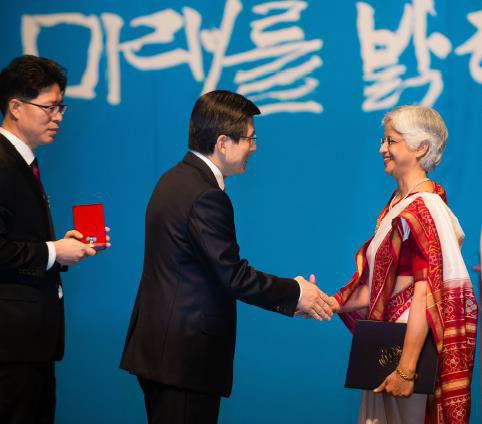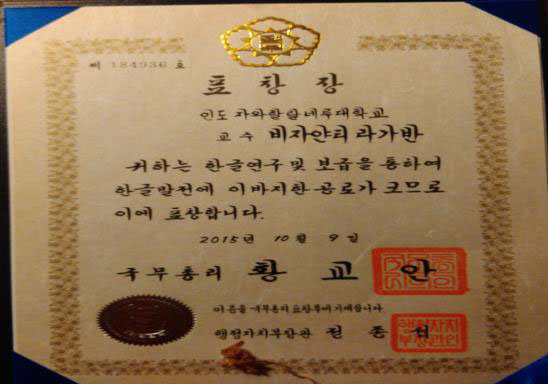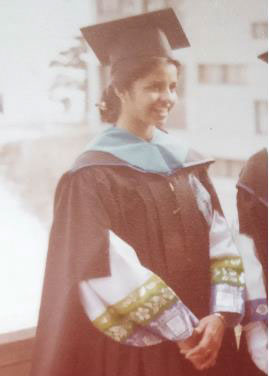
-
Parthasarathy Vyjayanthi Bhashyam
교수 (전 위원장)/한국학연구소(Centre for Korean Studies)/뉴델리 자와할랄 네루대학교(Jawaharlal Nehru University)
GKS 인도 동문/서울대학교(역사학 석사)/1977 년 초청
▶ Professor (also former Chairperson)/Centre for Korean Studies/Jawaharlal Nehru University, New Delhi
GKS-India/Seoul National University/(M.A./History)/invited in 1977

1. GKS(한국 정부 장학생)로서의 경험과 이 프로그램을 통해 배운 것에 대해 말씀해 주십시오.
제 이름은 비자얀티입니다. 그런데 이름이 길어서 1977년 당시 한국 학생들과 한국 사람들은 저를 "자야"라는 별칭으로 불렀고, 이 별칭이 지금까지도 이어지고 있습니 다. 저는 1977년 대한민국 정부에서 교육부 장학금(Ministry of Education Scholarship) 이라는 이름의 장학금을 받았습니다. 한국에서의 석사학위를 취득을 지원하는 장학 금이었죠. 저는 첸나이 지역에 위치해 있는 마드라스 대학교에서 1976년에 경제학 으로 학사과정을 마친 후, 델리로 가서 석사과정에 진학하려고 했습니다. 하지만 입 학 기간을 놓친 탓에 1년을 기다려야 했죠. 그러던 중 그 해(1976년) 자와할랄 네루 대학교에서 최초로 개설된 한국어 인증과정에 들어가게 되었습니다. 그리고 과정이 끝나갈 무렵, 한국 교육부의 장학생 선발 광고를 보게 되었죠. 여기에 응시해서 석 사과정 장학금을 받아 한국의 서울대학교에 향했고, 석사를 마친 1981년까지 그곳 에 머물렀습니다.
서울대 어학연구소의 중급 및 고급 한국어 과정을 마친 후, 저는 한국사 석사과정에 들어갔습니다. 전공을 바꾼 것은 한국에 왔으니 경제학 과정을 공부하기 보다는 한국에 대해 공부하는 것이 맞다고 생각했기 때문이었죠. 정말 많은 공부와 노력이 필요했습니다. 때로는 전공 공부를 위해 인사동에서 어떤 신사분께 한자를 배우기도 했습니다. 이런 과정을 모두 해낼 수 있었던 것은 장학생 동문들과 친구들 덕분이었습니다.
이후 1981년 졸업을 하고나서 저는 인도로 돌아갔습니다. 한국에서 보낸 1977년부터 1981년까지는 제 인생 최고의 시간이었습니다. 저는 한국의 진실된 본 모습을 보고 느꼈으며, 한국인의 따듯함과 애정, 그리고 저와 인도에 대한 진정한 호기심을 느낄 수 있었습니다. 비록 한국의 음식과 생활 양식이 인도와 매우 달랐지만 충분히 적응할 가치가 있다고 생각했기 때문에 저는 열린 마음과 긍정적 자세를 잃지 않았습니다. 한국에 와서 처음 자리잡았던 서울대 근처 신림2동의 하숙집 생활 또한 매우 훌륭한 배움의 기회가 되었습니다.
한국인들은 제가 한국에서의 유학생활을 잘 해낼 수 있도록 도와줬을 뿐 아니라 개인적, 사회적, 학문적 생활의 모든 면을 즐길 수 있도록 많은 도움을 주었습니다. 한국인들은 매우 따뜻했습니다. 또한, 교육부에서 제공한 한국의 문화유산 탐방과 장학생들과 함께 한 역사 답사 여행 덕분에 저는 한국의 많은 지역을 여행하고 볼 수 있었고, 한국에 머무는 동안 많은 외국 친구를 사귈 수 있었습니다.
제가 머물던 마지막 해에는 교육부에서 외국인 정부장학생들에게 강남구(지금은 상류층 주거지역이 되었죠)에 아파트를 마련해 주었습니다. 우리는 아파트에 함께 살면서 같이 밥을 해 먹었습니다. 일본인, 미국인 친구들과 음식을 나눠 먹었던 시간이 지금까지도 재미있는 기억으로 남아있죠. 저는 한국에서 보낸 시간을 아주 즐거운 추억으로 기억하고 있습니다.
1. Please share your experience as a GKS scholar and what you have learned from this scholarship program.
I must tell you at the outset that because my name was long (Vyjayanti), I was called by my shorter name, Jaya, by the Koreans in 1977 and ever since by my students too. I received the scholarship given by the Government of Republic of Korea in 1977. It was then called Ministry of Education Scholarship (교육부 장학금). It was given for me to pursue my Master‟s Degree in South Korea. I had completed my Bachelor‟s degree in Economics from University of Madras (now Chennai) in 1976 and had moved to Delhi to pursue my Master‟s. But since the admissions weas over I had to wait for a year. Meanwhile, I joined a Certificate course in Korean language that was started for the first time at Jawaharlal Nehru University that year (1976). It is before I finished that course that the Ministry of Education of ROK advertised for a scholarship. I applied for it and got the scholarship, and I ended up doing my Master‟s at Seoul National History and was there until 1981.
At SNU, I had to do an Intermediate and an Advanced level Korean language course at the Language Research Institute (어학연구소) before joining my Master‟s in Korean History. I switched majors because having come to Korea it made sense to study about Korea rather than do a generic Economics course. I had to work very hard and also learn Hanja from a gentleman in Insa Dong because of my major. But I got through all that with help from my batch mates and friends.
I graduated in 1981 and returned to India. I would say that the years from 1977 to 1981 in Korea were the best years of my life. I saw and felt Korea in its true original form. I felt the warmth of the people, their affection, their genuine curiosity about me and about India. Though the food, living style, and the general life in Korea were very different from what I had been used to but, I had gone there with an open mind and a positive attitude. I accepted their culture as one that was different but worth adapting to. I initially stayed in a boarding house in Shillim 2 Dong, near SNU. That too was a wonderful learning experience.
The Koreans helped me not only get through but also greatly enjoy every aspect of my personal, social and academic life. They are very compassionate people. I was able to travel and see large parts of Korea thanks to both, the Ministry of Education that took us to all the cultural spots, and the history course field trip (답사 여행) with my batch mates to the interiors of Korea. During my stay I also made a lot of international friends. During the last year of my stay the Ministry of Education had got some apartments in Kangnam Ku (now Gangnam Gu, which has now become such an upmarket place) for the international students who were on Government scholarship. We shared the apartments and cooked our own meals. I shared mine with a Japanese student and an American student, and that too was a lot of fun. I very fondly reminisce my days in Korea.

2. 졸업 후 경험에 대해 말씀해 주십시오.
1981년 저는 모교인 자와할랄 네루 대학교(JNU)으로 돌아가 임시 강사가 되어 언어를 가르쳤습니다. 그러면서 당시 이곳에서 처음으로 한국어 수업을 시작하셨던 동국대 서경수 교수님을 지원하는 업무도 맡았습니다. 하지만 수업에 대한 수요가 그리 크지 않았기에 안타깝게도 1983년 학교에서는 임시직을 없애기로 결정했고, 이후 저는 프리랜서 통번역가로 활동하며 델리에서 한국인들에게 영어를 가르쳤습니다.
결혼을 해서 두 명의 아이도 두었습니다. 그런데 아이들이 학교에 갈 정도로 자라 고 나니 다시 커리어를 이어가고 싶어 졌습니다. 대학에서 한국학과 관련된 일을 할 수 있으리라는 희망은 모두 포기한 상태였기에, 1993년 고등학교에서 경제학을 가르치기 시작했습니다. 그러던 중 1999년 말, 자와할랄 네루 대학교의 한국어 강사 모집 공고를 보았습니다. 알고보니 자와할랄 네루 대학교는 1995년 한국어 학사학 위 과정을 설립하였고 1998년에는 석사과정도 개설해 있었습니다. 이에 따른 강의 인력 충원으로 저를 비롯한 두 명이 한국어학과 조교수로 채용되었죠.
그 이후 2001년 저는 자와할랄 네루 대학교의 국제대학원에서 한국학 박사과정에 진학했습니다. 지금도 그렇지만 당시에도 북핵은 매우 뜨거운 이슈였고, 이 주제에 대한 지도교수님을 찾아 논문을 쓰기 시작했습니다. 그리고 교수 업무가 바빴던 탓에 2006년이 되어서야 박사 논문을 완성할 수 있었습니다. 저는 언어학 단과대학에서 한국어와 한국사, 그리고 한국 문화를 가르치고 있습니다. 한국학과는 이후 크게 성장해나갔습니다. 처음에는 여러 연구소 및 학과의 일부 분야였지만, 나중에는 하나의 독립된 연구소로 발전했습니다. 1970년대에는 아프리카-아시아어연구소의 일부였고, 2000년 제가 강의를 시작했을 때는 일본 및 동북아학연구소에 속해 있었습니다. 이후 2003~2004년 무렵, 한국어라는 이름을 정식으로 명명한 일본, 한국, 및 동북아학연구소(CJKNEAS)가 설립되었습니다. 마침내 2013년 독립된 연구소인 한국학연구소(CKS)가 문을 열었습니다. 남아시아에서 한국어로 학사, 석사, 박사과정을 수여하는 전문 과정은 한국학연구소가 유일하며, 이는 매우 자랑스러운 일입니다. 2015년, 저는 인도에서 한국어 교육을 증진한 공로로 대한민국 국무총리상(한글 발전 유공자 표상)을 받았습니다.
학교의 한국학 강사와 교수도 2000년 2명에서 2019년 9명으로 증가했으며, 총 학생 수는 약 150 명에 이르렀습니다. 한국어에 대한 수요는 훨씬 더 크지만 약 40명으로 정해진 학과 규정에 따라 신입생을 받고 있습니다. 많은 학생들이 현재 한국에서 다양한 장학 프로그램을 통해 학위 취득을 위해 공부하고 있으며, 이들 중 많은 수가 한국과 인도를 비롯한 세계 각국에서 좋은 일자리를 찾았습니다. 한편, 한국 정부와 주 인도 한국대사관의 도움으로 우리는 언어대학 내에 '한국 코 너'를 만들었습니다. 한국 코너는 최첨단 시설과 교육용 장비를 갖춰 다른 언어학과 의 부러움을 받고 있습니다. 또한 한국 대사관, 한국국제교류재단(KF), 인도 재외한 국문화원(KCCI), 한국관광공사(KTO), 한국문학번역원(KLTI), 재인도한인회의 지원으 로 다양한 행사를 개최하고 있습니다. 도움을 주신 분들께 감사를 표합니다. 연구소 에서 개최하고 있는 행사는 대학교 전체에서 유명한 인기 행사로 자리잡아 모두가 손꼽아 기다리는 인기 행사가 되었습니다.
2. Please share your experience/story after graduation.
After returning in 1981 I joined my alma mater, Jawaharlal Nehru University, as an ad hoc lecturer, teaching the language and assisting my own Professor, Dr. Suh Kyung-soo from Dongguk University who was the first to have started the language course at JNU. However in 1983 the university decided to scrap the ad-hoc post as the demand for the language was not much and they did not feel the need for an extra hand. I then started freelancing, doing translation and interpretation work and also teaching English to Koreans in Delhi. Meanwhile I had also got married and had had two children. When they were old enough to go to school I wanted a career for myself. I had given up all hopes of getting an academic job related to Korean studies at the university so I joined as a high school teacher in 1993, teaching Economics. It was only at the end of 1999 that JNU advertised for teaching positions for Korean language. The course at JNU had become a B.A. Degree program in 1995 and a M.A program in 1998. They needed more faculty members and I along with two more joined the department as Assistant Professors.
It is after joining that I enrolled for my Ph.D at the School of International Studies in 2001and did my doctorate in Korean Studies. North Korea‟s nuclear issue was a hot topic those years, as it is even now, and I could find some one to supervise my dissertation only on such topics. I completed my doctorate only by 2006 as the teaching load was quite heavy. I teach the language, culture and history of Korea in the School of Languages.
The department has grown immensely since then. Korean language was initially part of many Centers (departments) before it evolved into a separate Center. It was part of the Centre for Afro-Asian Languages in 1970s then it had became part of the Centre for Japanese and Northeast Asian Studies (CJNEAS) when I joined it as a faculty member in 2000. Around 2003-04 we got the name Korean inducted into the nomenclature and it became the Centre for Japanese, Korean and North East Asian Studies (CJKNEAS). In 2013 we managed to get a separate and independent Centre - the Centre for Korean Studies (CKS). I think it is the only full-fledged department running courses from B.A., M.A., M.Phil to Ph.D in Korean Language in all of South Asia. We are very proud of that. I am proud to say that I have awarded by the Prime Minister of South Korea in 2015 for the promotion of Korean in India. (한글 발전 유공자 표상).
The number of faculty members has also grown from just 2 in 2000 to 9 in 2019. The total student strength is about 150. Though the demand for the language is a lot more but we are able to take only around 40 new students every year. A large number of our students are currently in Korea pursuing their higher studies on various scholarships, and many have also been placed in good jobs in Korea, India and elsewhere. With the help from the Korean Government and the Korean Embassy here we were able to also set up the „Korea Corner‟ in the School of Languages. It has the state of art equipment and teaching devices, and is the envy of all other language departments. We are also able to hold a number of events thanks to the support from the Korean mbassy, Korean Foundation(KF), the Korean Culture Centre India (KCCI), Korea Tourism Organisation (KTO), Korean Literary Translation Institute (KLTI), the Korean Residents Association in India, and some others. We are ever grateful to all these organisations. The events held by the Centre are so popular in the whole university that other departments wait eagerly for them.

3. 장래 계획과 GKS 동문에 대한 의견/생각을 자세하게 설명해 주십시오.
저는 한국어연구소의 설립을 위해 그동안 최선을 다해왔습니다. 이제 우리의 꿈은 한국어연구소를 인도뿐 아니라 남아시아 전역의 한국학 허브로 만드는 것입니다. 저는 내년에 은퇴를 앞두고 있지만 학생과 동료들이 우수한 업적을 쌓아 훨씬 더 빠른 속도로 많은 것을 성취할 것이라고 확신합니다.
한국은 사람들을 끌어 들이고 계속해서 머물게 하는 매력이 있는 나라라고 생각합니다. 그렇지 않고서는 한국이 세계에 거의 알려지지 않았던 1970 년대부터 제가 계속해서 한국에 관심을 두게 된 것을 설명할 수 없을 것입니다.한국에서 좋은 친구들과 제 인생 최고의 시간을 보낼 수 있는 기회를 제공하고, 한국학이라는 풍성한 학문 분야에서 전문성을 습득할 수 있도록 도와주신 한국 정부에 진심으로 감사드립니다.
마지막으로 GKS 장학생들에게, 제가 그랬던 것처럼 기회를 최대한 활용하고 한국에서의 시간 동안 최대한 관찰하고 배움으로써, 고국에 돌아와서 훌륭한 한국 대사가 되어 한국에 기여하시라고 말씀드리고 싶습니다.
3. Please explain in detail your future plan and comments/thoughts for GKS Alumni.
I have put in my best effort until now to put the Korean language studies on the academic map of the university. Now our dream is to make the Centre a hub of Korean Studies not only in India but in all of South Asia. I retire next year but I am sure that my colleagues, many of whom were my students, will carry on the good work and achieve much more than what I have set my eyes on.
I feel that Korea has a charm that attracts people to it and keeps them engaged in the field. How else can one explain my sustained interest in it from the 1970s when Korea was hardly known to the world? Finally, I would really like to thank the Korean government for having given me the opportunity to spend the best years of my life in Korea and help me gain expertise in an area that has been so satisfying and enriching. I have also made some very good friends.
I would like to tell the students on GKS scholarship that they should make the most of the opportunity and observe and learn as much as possible while they are there and contribute back to Korea by being good ambassadors of Korea in their own the country. I have tried my best to contribute in my own way.
GKS Program, Global Korea Scholarship Team (4th Floor)
NIIED(National Institute for International Education)
Jeongjail-ro 191, Bundang-gu, Seongnam-si, Gyeonggi-do, 13557, Republic of Korea
www.studyinkorea.go.kr kgspniied@korea.kr

NIIED(National Institute for International Education)
Jeongjail-ro 191, Bundang-gu, Seongnam-si, Gyeonggi-do, 13557, Republic of Korea
www.studyinkorea.go.kr kgspniied@korea.kr





